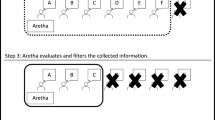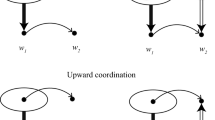Abstract
The radical probabilist counsels the prudent never to put away uncertainty, and hence always to balance judgment with probabilities of various sizes. Against this counsel I shall advise in favor of the practice of full belief — at least for some occasions. This advice rests on the fact that it is sometimes in a person's interests to accept certain propositions as a means of bringing it about that others recognize oneself as having accepted those propositions. With the pragmatists, therefore, I shall reject the view that belief formation must in every instance be a truth-directed affair. Unlike the pragmatists, however, I shall conclude that the enterprise of belief formation is not directed exclusively, or even primarily, at attaining knowledge. In other words, pursuit of that which it profits to believe, on the one hand, and pursuit of knowledge on the other, are distinct enterprises, which overlap (when they do) only accidentally.
Similar content being viewed by others
Author information
Authors and Affiliations
Rights and permissions
About this article
Cite this article
Thalos, M. Why we Believe. Journal for General Philosophy of Science 30, 317–339 (1999). https://doi.org/10.1023/A:1008394130995
Issue Date:
DOI: https://doi.org/10.1023/A:1008394130995




